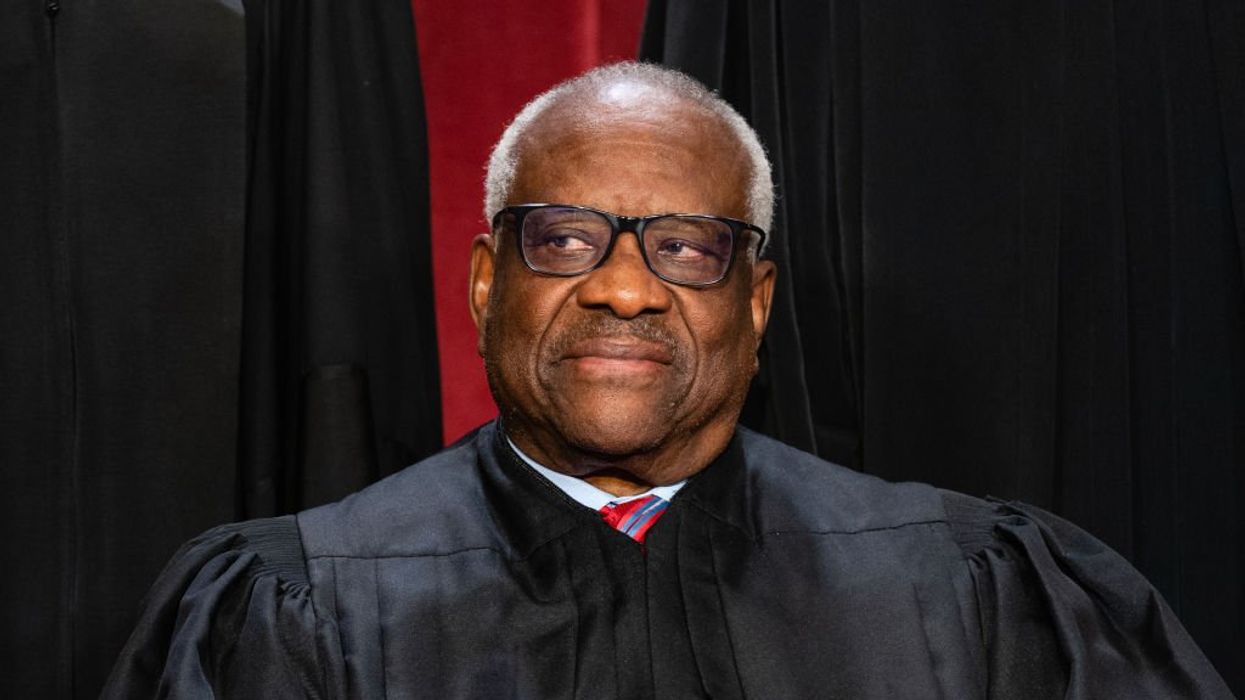
Eric Lee/Bloomberg/Getty Images

One thing we learned from the courts throughout COVID is that there is almost nothing state and local government officials cannot do to your life, liberty, and even body under the guise of public health. Yet for years, these same courts have placed limitations on the ability of government officials to pray in public when nobody is coerced to join them. Pagan groups have been empowered to shake down cash-strapped local governments in cumbersome lawsuits over the issue of public prayer, and Justice Clarence Thomas is finally calling for an end to this insanity.
In 2014, after a shooting spree in Ocala, Florida left several children injured, police chaplains worked together with community leaders and members of the NAACP to hold a prayer vigil. It was the perfect way to come together and deal with the grief of the community. However, over the past generation, there have been atheist agitation groups seeking to traumatize the rest of us by uprooting God from the public square, even after atrocities like this one. Nobody was forced to attend the event, but a few atheists voluntarily attended, so that they could feign “offended observer” status as having been offended by the expression of religious faith by police officials, and opted to sue the city for a violation of the Establishment Clause of the Constitution. Because, you know, holding a voluntary prayer vigil is somehow akin to establishing a national religion.
The federal district court not only granted standing to these clowns but actually gave summary judgement in their favor that the prayer indeed violated the Establishment Clause. The Eleventh Circuit absurdly upheld the standing of the two plaintiffs, but remanded the case back to the lower court on the merits because the Supreme Court had since tightened the definition of the Establishment Clause. Last year, in Kennedy v. Bremerton School Dist., the Supreme Court overturned the fabricated “Lemon test,” which precluded the government from holding religious services when a reasonable observer would consider it as taking sides in religion. Instead, the court ruled that the understanding of the constitutional clause at the time of our founding must prevail in these cases.
However, the city of Ocala rightfully asked the Supreme Court to intervene and shut down these lawsuits once and for all. Atheists and satanic groups are going around the country dragging cash-strapped localities into court for every last mention of God. Even though most of their lawsuits will eventually lose on the merits, there is no reason for this charade and trauma to continue. Justice Thomas has long argued that these people should never even get standing in court to bring a lawsuit, an argument he reiterated earlier this week in his lone dissent from the court’s decision to reject the appeal from the city of Ocala.
To begin with, Justice Thomas is correct in his long-standing view that the Establishment Clause applies only to the federal government — not state and local governments. Even if one buys into the specious “Incorporation Doctrine” that says every aspect of the Bill of Rights was retroactively applied to the states by the adoption of the 14th Amendment, that only holds true for the individual rights expressed in those amendments, not the Establishment Clause. Indeed, nine of the 13 states had established religions at the time the Constitution was ratified, and that is precisely the reason why the framers wanted to keep it out of the federal government.
Now on to standing. Even if a government legitimately violated the Establishment Clause, how could “offended observer” sentiments be sufficient to obtain standing in court? How does a replica of the 10 Commandments or someone uttering a prayer affect a person’s life, liberty, or property? Remember, contrary to what some think, courts were not accorded force or will over public laws to rule on their constitutionality in the abstract. They can only rule on a valid case with direct injury to a particular party. Thomas expressed disappointment that the justices punted on this opportunity to finally shut down this charade.
“I have serious doubts about the legitimacy of the ‘offended observer’ theory of standing applied below,” wrote Thomas after years of frustration with these cases. Back in 1982, Thomas noted that the court ruled in Valley Forge Christian College v. Americans United for Separation of Church & State “that ‘the psychological consequence presumably produced by observation of religious conduct with which one disagrees’ is ‘not an injury sufficient to confer standing under Article III, even though the disagreement is phrased in constitutional terms.’”
Thomas warns that unless the Supreme Court undoes the decades’ worth of damage to the Establishment Clause standing issue, the goofballs will continue terrorizing those who utter God’s name anywhere near government. “This Court’s intervention has become increasingly necessary, as time has demonstrated that this problem is not going away by itself,” warned the most senior justice. “Even those Courts of Appeals that recognize the apparent illegitimacy of offended observer standing now find themselves bound by Circuit precedent to apply it.”
Justice Gorsuch also wrote separately to affirm his believe that offended observer standing is likely garbage; however, he defended the court’s reluctance to pre-judge this case as it percolates through the lower courts.
The problem with Gorsuch’s strategy, as we’ve seen elsewhere, is that wrong decisions by lower courts on foundational constitutional issues affecting society languish for years and cause needless suffering based on what SCOTUS knows to be bad law. If the Supreme Court really wants to remain “supreme,” it needs to exercise its supremacy early and often in the one area over which it truly is supreme: the wayward lower courts.Daniel Horowitz
Blaze Podcast Host